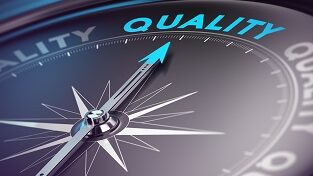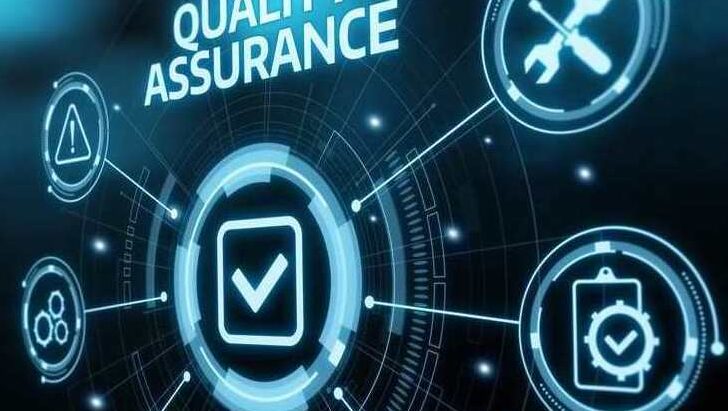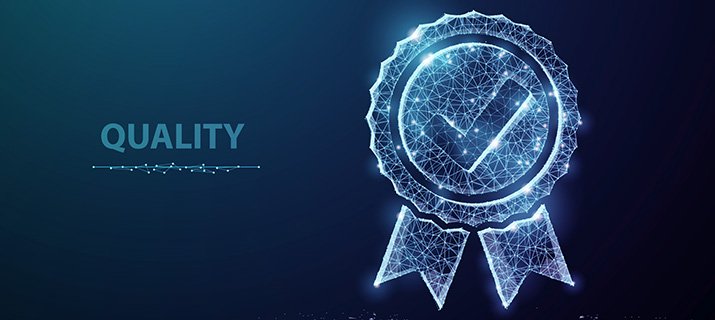
Quality @EOSC
Quality is a key aspect for the successful uptake of EOSC by the European research communities.
EOSC-Synergy streamlines the adherence to quality best practices through a comprehensive solution encompassing quality assessment, assurance and awarding for software, services and FAIR data. We deliver automated agile quality assurance.
Watch the SQAaaS in Action
Quality baselines
EOSC-Synergy defines, follows and promotes the adherence to best practices in software, services and FAIR data. In each of these areas specific quality criteria is used to define the minimum set of principles to attain and assess quality. The quality baselines provide the criteria that powers the EOSC-Synergy quality assurance and assessment tools.

Software quality baseline
Our approach starts with a pragmatic minimum software quality criteria meant to enhance the visibility, accessibility and distribution of source code while encouraging good coding practices to improve quality, reliability and security.
Openly developed and gathering the experience from multiple projects, the software criteria is a comprehensive set of quality conventions oriented to DevOps.

Service quality assurance
The minimum set of principles for reliable and fit-for-purpose services such as web services, web applications, platforms etc. Provides common coherent quality attributes aimed to ensure functional suitability and strengthening of the services reliability and stability.

FAIR quality indicators
The FAIR principles are a set of best practices to improve the quality of data in an Open Science context. EOSC-Synergy follows the FAIR indicators provided by the RDA FAIR Maturity Working Group, and athe FAIR indicators developed by FAIRsFAIR. These indicators together with the FAIR assessment tools are used to assess the degree of FAIR adoption and compliance.
Quality assurance and assessment tools
The adoption of quality-based practices is one common struggle when it comes to developing software in research environments. EOSC-Synergy provides a rich set of tools for quality assurance and assessment in order to meet the Open Science values. Our tools enable automation of DevOps processes and implement in practice the three quality baselines,.
Improving EOSC quality through automated quality assurance and assessment
SQAaaS
The EOSC-Synergy quality assurance as-a-service platform (SQAaaS) enables the on-demand creation of CI/CD pipelines making quality verification and validation easily accessible to EOSC developers.
The Pipeline as a Service building block allows you to compose and test customized CI/CD pipelines in accordance with reference criteria.
The Quality Assessment & Awarding building block analyses, building upon your input, the level of compliance to the quality baselines.
The SQAaaS integrates a wide range of quality verification tools that are made easily available through a friendly web interface.
JePL
Tech-savvy users tend to favor code over a graphical interface for the task of managing their CI/CD pipelines.
Especially suitable for complex setups, you can use directly the Jenkins Pipeline Library (JePL) the same library that powers the SQAaaS platform.
Just add JePL to your repository and build your software or service quality assurance using YAML descriptions to benefit from the full set of features.
FAIR Assessment tools
Our main FAIR assessment tool is the FAIR EVA (Evaluator, Validator & Advisor), developed by EOSC-Synergy to implement the assessment of the RDA FAIR indicators .
The FAIR EVA checks different features in published data like persistent identifier, metadata richness, access to data and use of controlled vocabularies.
The FAIR EVA and the F-UJI tool are also integrated in the SQAaaS platform.

Quality Badges
The last step of the EOSC-Synergy quality process to foster EOSC adoption is the awarding of digital quality badges for software, services and FAIR data. The SQAaaS platform harnesses the potential of the Open Badges specification to issue digital badges rewarding and certifying the compliance to the quality baselines.
Rewarding quality achievements and improving visibility of the software, services and data quality attributes
Software quality awarding
Obtain rewards and visibility from your software quality. Once the software quality assessment is completed you will get a digital quality badge. From bronze to gold your increased compliance towards the software quality criteria is awarded.
Service quality awarding
Obtain rewards and visibility from your service quality. Once the service quality assessment is completed you will get a digital quality badge. From bronze to gold your increased compliance towards the service quality criteria is awarded.
FAIR data badges
Obtain a FAIR data quality badge. A set of metrics derived from the RDA and FAIRsFAIR indicators has been established. Depending on how well a dataset or digital object has been defined and published, badges from bronze to gold are awarded.